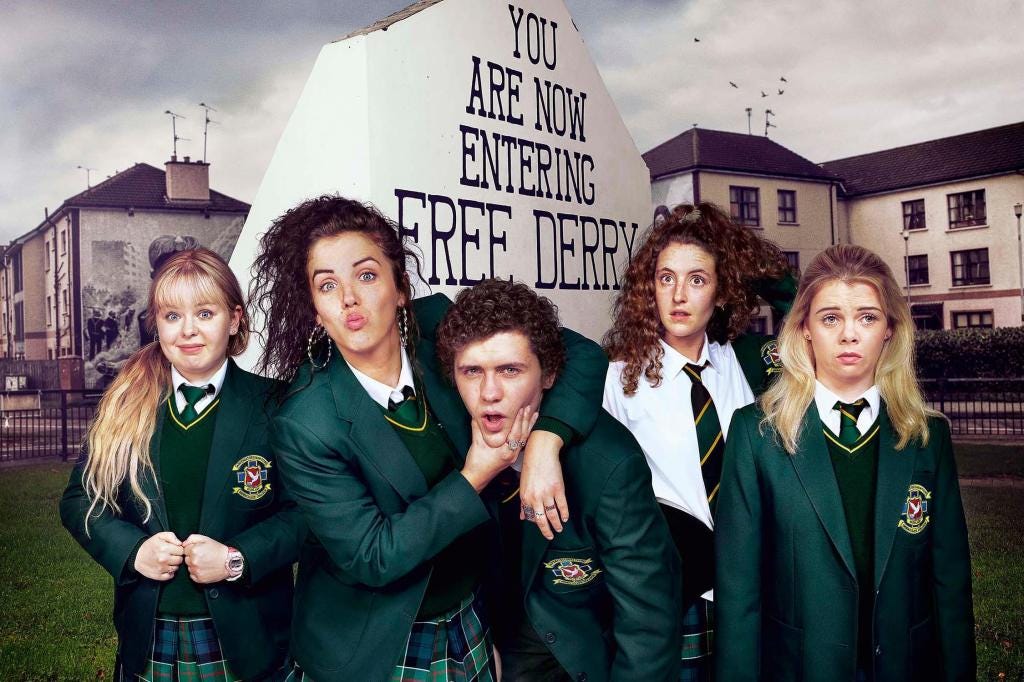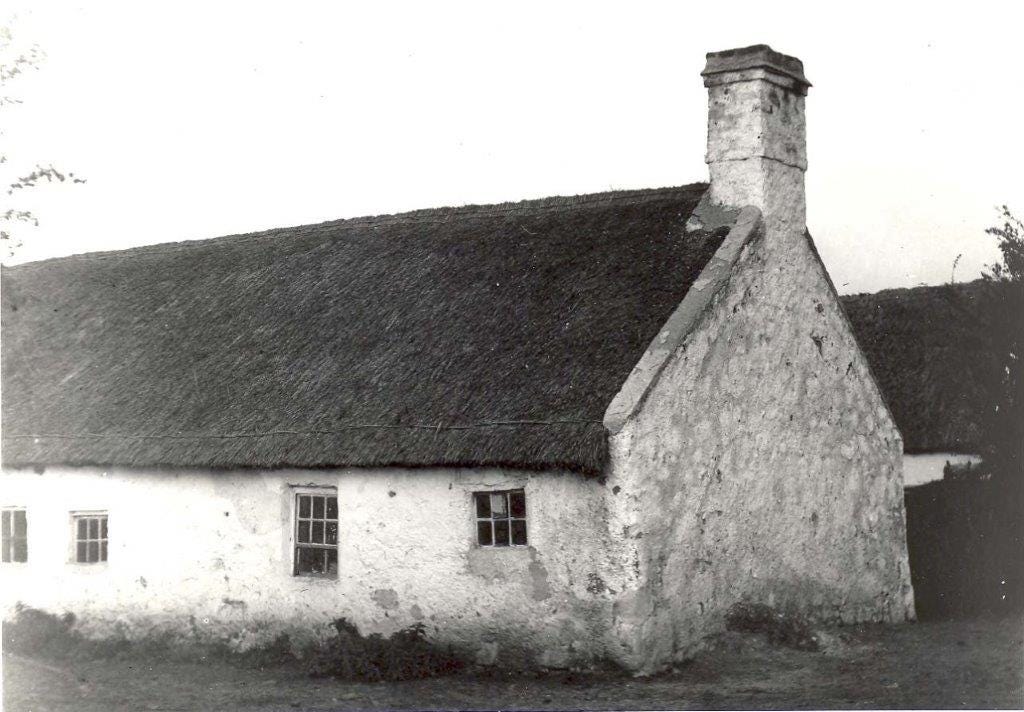When I tell my friends, family, and passing strangers on the street to watch Derry Girls, I always tell them that they’ll do themselves a favor by turning on the subtitles. “You could never understand them otherwise,” I say. The accents are too foreign to my American ears, not to mention the fast-paced dialogue delivery that is one of the show’s hallmarks. But truly, I do recommend it to just about everyone; I laughed, I cried, et cetera.
And I also realized, in watching it, that I knew nothing about Ireland. It’s to the west of England. To the east, by a bit more, of the United States. I’m pretty sure it’s where my blonde, curly hair comes from — by everyone’s best guess, anyway. Where else could it be?
I’d learned a bit of English history in my high school Western Civ class; learned some more when I studied abroad there. But the extent of my knowledge even about European countries is embarrassing, in part due to my opting to take AP Comparative Government instead of AP European History in eleventh grade. In my regular history classes, I recall learning about the American Revolution and the American Civil War approximately 15 separate times from elementary through high school, but the rest of the world? Well, not really worth mentioning, apparently.
I even went to Dublin and managed still to absorb nothing! Granted, I was there for a quick weekend to visit friends who were studying there and spent most of my time with them on UCD’s campus. Truthfully the only thing I remember doing is seeing Temple Bar. (I do really wish I were kidding here.) I do also with great specificity remember finding out that the large spire in central Dublin near the River Liffey is called by locals the “stiffy on the Liffey.” A likely thing for a nineteen-year-old brain to think, “This is what I will store forever.”
I consider my lack of knowledge on Ireland’s history and culture half-failure, half-embarrassment. In large part, it is also due to a lack of exposure: there is very little information or media that we receive in the US that deals with Ireland, much less its history. However, I’ve recently been working to change this — to learn more both generally and also specifically about my ancestors.
Before I left for my Shelter Island trip, where I engaged with difficult history that other ancestors were directly involved in, I decided I wanted to bring some sort of token of protection. Something that would bring me peace and comfort if I needed it. I did some research and ended up with a Celtic Dara Knot necklace — it symbolizes the oak tree, and therefore strength but also roots, the connection between birth and death.
I did find immense comfort in it, and in the thought that in my ancestors’ history might be, on a larger scale, some good. I have trouble with a lot of readings on ancestors, when they talk about finding and meeting with your ‘healed’ ancestors. I’m not sure how I’m supposed to find out who these people are, how to determine them from the general group, and particularly in the case of those who were colonizers or embodied a colonizing tradition, I’m left confused about just what healing means or could have meant for these people.
I therefore spent the Yule period and its surrounding dark days researching and learning more about Ireland in order to lay a historical framework for my ancestor search. My ultimate goal is, after this, to learn more about Celtic myth and religion. Bored and tired of reading about Christianity, I want something new, and I want something to connect with. But for me, I feel a desire to connect with something that belongs in some way to me. Could the Celts be of assistance here? Maybe they will.
I received some very helpful information from my paternal grandfather, who shared with me names, dates, and counties of birth for several generations of Irish ancestors. This confirmed what my DNA test results say, which is that 45% of my genetic makeup is found in Northern Ireland, Scotland, and northeastern England. While several family lines of my English ancestors have been relatively easy to trace due in part to their being prominent people and therefore well-documented, this isn’t quite the case with the Irish. So far, all I know with certainty are names and counties.
All of them hail from Northern Ireland, but the last names didn’t quite look Irish to me (with a few exceptions). Doing some searches alongside reading further about Ireland’s history has brought me to understand that of the Irish ancestors whose names I have, going back into the 19th century, most emigrated to America during or around the “Potato Famine,” which was not really a famine. There was a potato blight, which was devastating to the average person, as the crop made up a significant portion of their everyday nutrition. However, Ireland still continued to export massive quantities of other food to the rest of the world, and Britain failed to step in to save lives or keep people from fleeing due to hunger.
“Although the potato crop failed, the country was still producing and exporting more than enough grain crops to feed the population. But that was a 'money crop' and not a 'food crop' and could not be interfered with.”
Ireland Before and After the Famine by Cormac Ó Gráda
It’s unsurprising that my ancestors were among those who fled and set up new lives for themselves in America. Millions of people did the same in that period, decimating the Irish population.
There isn’t much more information about these people beyond their names, so this is what I can go by at the moment. In searching up the surnames, or also by using common sense (such as for those whose surname is literally “English”), I find that most of these families originated in Scotland or England. In fact, my own last name, Armstrong, is from the border of Scotland and England (which I did already know).
So going off of the surnames being Scottish or English, I’m able to hazard a general guess of who these folks are. See, in the 16th and 17th centuries, England conquered Ireland and drove hundreds of thousands of people from Ulster, northeastern Ireland, to the south and west. The vast majority of these were Catholics who were replaced by Protestant settlers from Scotland and England. Often, these settlers were given the land that the English had taken from the original residents. This was called plantation and primarily occurred in the north, with folks from southern Scotland and northern Europe simply crossing the Irish Sea to settle in their new life in Ireland, loyalists to the English crown.
It’s not entirely different from those English ancestors who skipped the time in Ireland and instead came directly to America in the 17th and 18th centuries. Some of them came for religious reasons, but in truth, most of them seem to have come for better opportunities, which they found within the stolen land.
In 1695, England created a series of extremely harsh Penal Laws against Irish-Catholics which massively restricted their rights. It also essentially outlawed Catholicism, which 90% of Irish people practiced.
And so I find a similar story being played out in a different place by different ancestors, though from the same origin. It’s not shocking, as birds of a feather and all that, but I think it also drives something home about cycles.
Still, though these (likely Protestant) Irish ancestors may have originated in Scotland, this calls me to turn my eye there. And at least, knowing that my people were Celtic in some form or other, I can rest assured knowing that they were not, to start with, Roman.
A great source for further reading:






Hello from northern England! Don't know how I came across you but I loved reading this, thanks for sharing. I hope you don't mind the unsolicited recommendations, but do you know Sharon Blackie? She has a wonderful substack about celtic mythology and connection to land that you might find helpful in connecting to celtic roots. The British Isles have such a tangled web of colonialism going back so far. I think what I take heart in is that in all the complexities, all of us with anglo ancestors will have people in our bloodlines who resisted and healed, whether we ever know their names or not. Leah Manaema Avene says that when ancestors return to the earth they release their toxic colonial mentalities and want the best for us and are cheering on our resistence work. I don't know whether that resonates, and regardless, I think it amplifies rather than diminishes our responsibility to heal and resist colonial patterns but is also comforting, somehow.
Sending love and appreciation